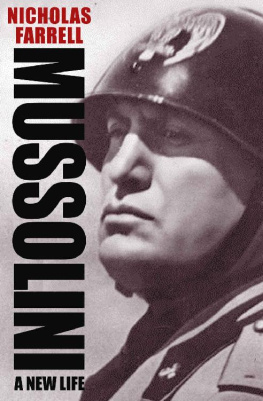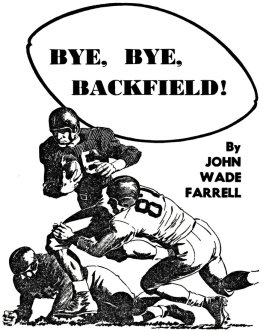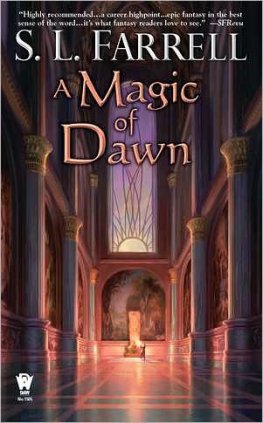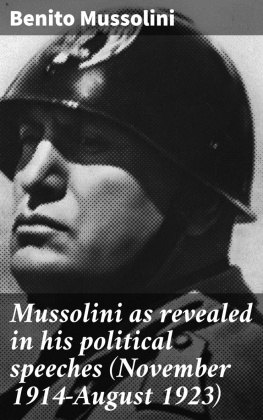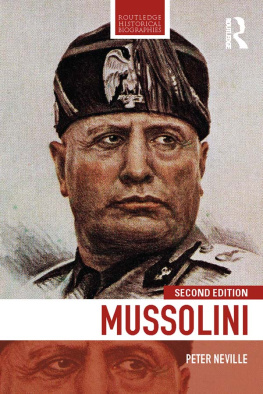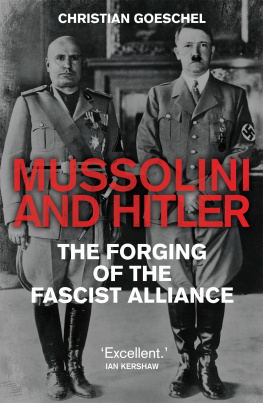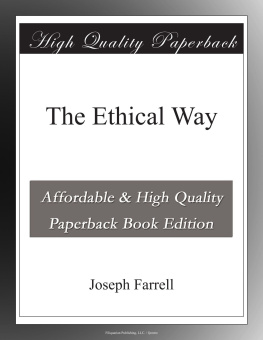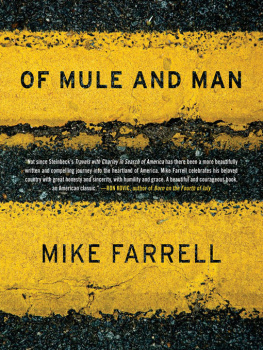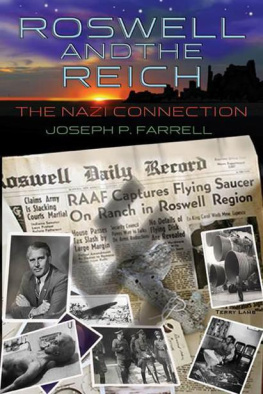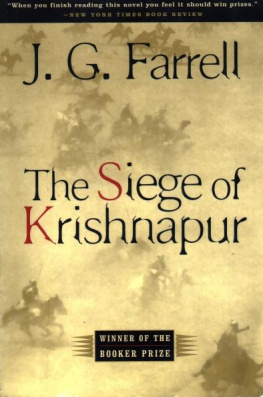Nicholas Farrell - Mussolini: A New Life
Here you can read online Nicholas Farrell - Mussolini: A New Life full text of the book (entire story) in english for free. Download pdf and epub, get meaning, cover and reviews about this ebook. year: 2018, genre: Detective and thriller. Description of the work, (preface) as well as reviews are available. Best literature library LitArk.com created for fans of good reading and offers a wide selection of genres:
Romance novel
Science fiction
Adventure
Detective
Science
History
Home and family
Prose
Art
Politics
Computer
Non-fiction
Religion
Business
Children
Humor
Choose a favorite category and find really read worthwhile books. Enjoy immersion in the world of imagination, feel the emotions of the characters or learn something new for yourself, make an fascinating discovery.
- Book:Mussolini: A New Life
- Author:
- Genre:
- Year:2018
- Rating:4 / 5
- Favourites:Add to favourites
- Your mark:
- 80
- 1
- 2
- 3
- 4
- 5
Mussolini: A New Life: summary, description and annotation
We offer to read an annotation, description, summary or preface (depends on what the author of the book "Mussolini: A New Life" wrote himself). If you haven't found the necessary information about the book — write in the comments, we will try to find it.
Mussolini: A New Life — read online for free the complete book (whole text) full work
Below is the text of the book, divided by pages. System saving the place of the last page read, allows you to conveniently read the book "Mussolini: A New Life" online for free, without having to search again every time where you left off. Put a bookmark, and you can go to the page where you finished reading at any time.
Font size:
Interval:
Bookmark:
Mussolini
A New Life
Nicholas Farrell
Copyright Nicholas Farrell 2003
The right of Nicholas Farrell to be identified as the author of this work has been asserted by him in accordance with the Copyright, Designs and Patents Act, 1988.
First published in the United Kingdom in 2003 by Weidenfeld & Nicolson.
This edition published in 2018 by Sharpe Books.
To my father
Table of Contents
Acknowledgements
I should like to thank the following people for their help: Fabio Andriola, Patrick Bishop, Carla Camerani, Vittorio Celli, Giorgio Frassinetti, Natasha Garnett, Lorenzo Giovene, James Hale, John Hunt, Frank Johnson, Luke John Oxlade, Stuart Reid, John Sartini, Ion Trewin and Victoria Webb.
N.F.
*
The monumental biography of Mussolini by the Italian historian Renzo De Felice is the starting point for any biographer seeking factual source material. De Felices oeuvre consists of eight books, the first published in 1965, the last in 1997 (posthumously), and runs in total to just over 7,000 pages. The books are labyrinthine and impossible going for all but the very committed. Understandably, they have never been published in English. Yet they contain what far too many books on Mussolini in any language lack: facts thousands of them.
I list them below with in brackets the date of first publication. I have used the Einaudi paperback edition published between 1995 and 1998.
Mussolini il rivoluzionario 1883 - 1920 (1965)
Mussolini il fascista
I. La conquista del potere 1921-1925 (1966)
II. Lorganizzazione dello Stato fascista (1968)
Mussolini il duce
I. Gli anni del consenso 1929-1936 (1974)
II. Lo Stato totalitario 1936-1940 (1981)
Mussolini Ialleato
I. Lltalia in guerra 1940-1943
1.Dalla guerra breve alia guerra lunga (1990)
2.Crisi e agonia del regime (1990)
II. La guerra civile 1943-1945 (1997)
In addition the eighteen volumes of Benito Mussolini, Scritti e discorsi are a source throughout the text. Whenever a new volume appears it is quoted as, for example, Scritti e discorsi , [being the volume number], La mia vita ( Con il Diario di guerra ) [being the volume title], p. 11. Thereafter subsequent references to the volume are referred to as, for example, Scritti e discorsi , , p. 11.
Foreword
Mussolini was one of the most talked about figures of his age and most of that talk was favourable. Pope Pius XI called him the man sent by Providence to save Italy, the American ambassador in Rome, Washburn Child, the greatest figure of his sphere and time and Churchill the Roman genius. But history is written by the victors and once Mussolini became a loser his place as one of the very bad men of history was guaranteed.
Those victors who believed in free will (western liberals) dismissed him as a grotesque buffoon and those who did not (Marxists), wherever they lived, as a mere tool of the bourgeoisie. Both were wrong because neither view explains how it was that Mussolini was able to get power and hold it, by and large bloodlessly, for two decades until his disastrous alliance with Hitler, or why for so long there was no resistance to him inside Italy and so much praise for him outside. Quite apart from anything else Mussolini began as a left-wing revolutionary and he could not stand the bourgeoisie. He was also a brilliant journalist, and you only have to read an article by him to realise that he was no buffoon.
We live in post-Communist times and there are signs that we are moving into post-democratic times as well. So perhaps the point has been reached at which it is possible to try to set the record straight.
When Mussolini abandoned Socialism to found Fascism as an alternative left-wing revolutionary movement he lived in a time of even greater uncertainty than our own. Fascism the so-called Third Way seemed to offer a viable alternative to both democracy and Communism. Mussolini did away with democracy but he did not, like most dictators, use mass murder to retain power. There was no need. He and Fascism had mass appeal because unlike democracy, especially Italian democracy, they got things done and unlike democracy they transformed politics into a form of religion from an isolated act involving the ballot box to a daily act of religious faith.
Mussolini was as popular with women as men, if not more so. Behind every great man, it is said, there is a woman. Behind this great dictator, who had 169 lovers according to one estimate, stood a nation of women. They were attracted by his masculinity; they were even more attracted by his politics. Such was the magnetism of both Mussolini and Fascism that the only honest verdict must be that he ruled with the consent of the Italian people.
Mussolinis fatal error was his alliance with Hitler, whom he despised, but this alliance was far from inevitable because Fascism and National Socialism were like chalk and cheese as were the Italians and the Germans; Italy and Germany did not even share the same strategic aims. The Pact of Steel resulted more from Mussolinis fear of Hitler than from any wild desire for world domination let alone the extermination of the Jews.
Just as none of the victorious powers went to war with Germany to save the Jews neither did Mussolini go to war with them to exterminate the Jews. Indeed, once the Holocaust was under way he and his Fascists refused to deport Jews to the Nazi death camps thus saving thousands of Jewish lives far more than Oscar Schindler.
It was only when he started losing battles that any resistance to him from within Italy worthy of the name began to form and despite what the post-war myth would have us believe this resistance was a largely irrelevant factor in the liberation of Italy. Once the liberation had happened, however, its Communist-dominated elements were responsible for the slaughter of 35,000 Italians without trial who joined the 15,000 Italians slaughtered by Titos Communist partisans in north east Italy slaughtered not because they were Fascist, but because they were Italian.
One of the aims of this book is to encourage the reader to consider whether Mussolini had better vision than Marx. For whereas Communist ideas appear terminally ill, the Fascist idea of the Third Way lives on and is championed by the standard bearers of the modern Left such as New Labour in Britain. This might surprise some, but to assume that Fascism was a phenomenon of the extreme right is to deny Mussolinis vision: he despised the bourgeois way of life la vita comoda above all else and remained at heart a Socialist to his dying day.
In Italy, barely a day goes by without discussion of Mussolini in the press or on the television. Since the re-election of the media tycoon Silvio Berlusconi as Prime Minister in 2001 such talk has increased as its focus has moved out of the realm of national soul-searching and into the political arena with the left shouting Fascism at Berlusconis every move. But if dictatorship is to replace democracy in Italy, or anywhere else in the west, it will be something quite different from the government of Berlusconi, a mild Thatcherite, let alone Fascism though it will undoubtedly contain a potent religious cocktail as a core attraction.
Most people, presumably, would agree that democracy, despite its faults, is the best political system on offer. But I have lived in Predappio for five years, where Mussolini was born, and is buried like a minor deity. And when I see a beautiful young woman doing the Roman salute in front of Mussolinis tomb I realise that she is yearning for something. And I know that whatever it is, it is not democracy.
This book, I hope, will above all make the reader wonder about the nature of good and evil and how difficult it is to tell them apart. Mussolini was a great man who failed because, as he himself was only too aware, of the nature of dictatorship. For as he said just before his death, Have you ever seen a prudent, calculating dictator? They all become mad, they lose their equilibrium in the clouds, in quivering ambitions and obsessions. And it is actually that mad passion which brought them to where they are. Mussolini was not a good man but nor was he half as bad a man as he has been portrayed. And he certainly was not an evil man.
Next pageFont size:
Interval:
Bookmark:
Similar books «Mussolini: A New Life»
Look at similar books to Mussolini: A New Life. We have selected literature similar in name and meaning in the hope of providing readers with more options to find new, interesting, not yet read works.
Discussion, reviews of the book Mussolini: A New Life and just readers' own opinions. Leave your comments, write what you think about the work, its meaning or the main characters. Specify what exactly you liked and what you didn't like, and why you think so.

